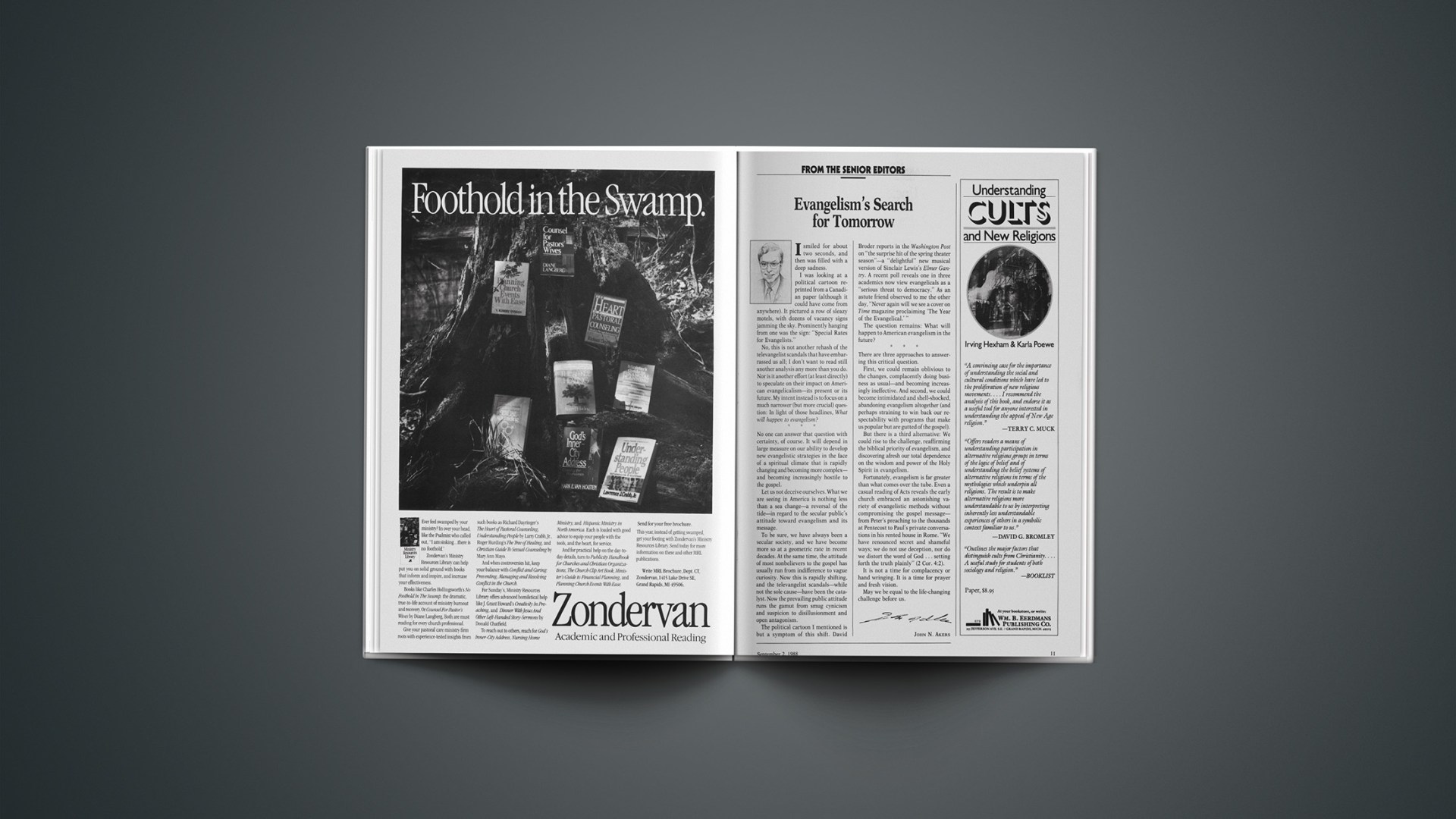I smiled for about two seconds, and then was filled with a deep sadness.
I was looking at a political cartoon reprinted from a Canadian paper (although it could have come from anywhere). It pictured a row of sleazy motels, with dozens of vacancy signs jamming the sky. Prominently hanging from one was the sign: “Special Rates for Evangelists.”
No, this is not another rehash of the televangelist scandals that have embarrassed us all; I don’t want to read still another analysis any more than you do. Nor is it another effort (at least directly) to speculate on their impact on American evangelicalism—its present or its future. My intent instead is to focus on a much narrower (but more crucial) question: In light of those headlines, What will happen to evangelism?
No one can answer that question with certainty, of course. It will depend in large measure on our ability to develop new evangelistic strategies in the face of a spiritual climate that is rapidly changing and becoming more complex—and becoming increasingly hostile to the gospel.
Let us not deceive ourselves. What we are seeing in America is nothing less than a sea change—a reversal of the tide—in regard to the secular public’s attitude toward evangelism and its message.
To be sure, we have always been a secular society, and we have become more so at a geometric rate in recent decades. At the same time, the attitude of most nonbelievers to the gospel has usually run from indifference to vague curiosity. Now this is rapidly shifting, and the televangelist scandals—while not the sole cause—have been the catalyst. Now the prevailing public attitude runs the gamut from smug cynicism and suspicion to disillusionment and open antagonism.
The political cartoon I mentioned is but a symptom of this shift. David Broder reports in the Washington Post on “the surprise hit of the spring theater season”—a “delightful” new musical version of Sinclair Lewis’s Elmer Gantry. A recent poll reveals one in three academics now view evangelicals as a “serious threat to democracy.” As an astute friend observed to me the other day, “Never again will we see a cover on Time magazine proclaiming ‘The Year of the Evangelical.’ ”
The question remains: What will happen to American evangelism in the future?
There are three approaches to answering this critical question.
First, we could remain oblivious to the changes, complacently doing business as usual—and becoming increasingly ineffective. And second, we could become intimidated and shell-shocked, abandoning evangelism altogether (and perhaps straining to win back our respectability with programs that make us popular but are gutted of the gospel).
But there is a third alternative: We could rise to the challenge, reaffirming the biblical priority of evangelism, and discovering afresh our total dependence on the wisdom and power of the Holy Spirit in evangelism.
Fortunately, evangelism is far greater than what comes over the tube. Even a casual reading of Acts reveals the early church embraced an astonishing variety of evangelistic methods without compromising the gospel message—from Peter’s preaching to the thousands at Pentecost to Paul’s private conversations in his rented house in Rome. “We have renounced secret and shameful ways; we do not use deception, nor do we distort the word of God … setting forth the truth plainly” (2 Cor. 4:2).
It is not a time for complacency or hand wringing. It is a time for prayer and fresh vision.
May we be equal to the life-changing challenge before us.
JOHN N. AKERS










